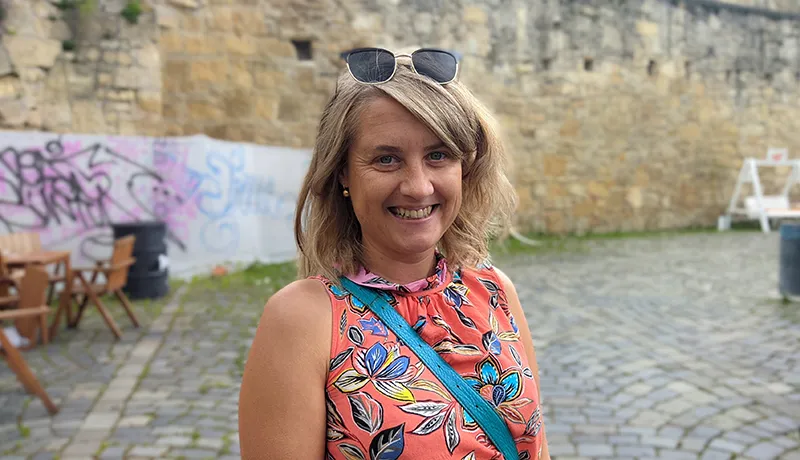Today, many things in psychology are pushed too far, says psychotherapist Linda Horváth.
Psychologist Linda Horváth completed her studies in Cluj and Switzerland, and studied clinical psychology and Chinese medicine at the University of Zurich. After a few years of work in Switzerland, he moved to Cluj, where he runs a private practice. In addition to psychotherapy, she also deals with acupuncture, reflexology, therapeutic massage, cupping, and moxa therapy.
the monthly bestseller list in Helikon for a while now, and for a long time, the non-fiction literature category only includes books on psychology, self-knowledge, and life management. So there is a huge demand for these books. What does that tell you?
This is a sign of loneliness. Which became acute mainly with covid and the lockdowns. Many people are alone and need such nourishment. The covid was only a catalyst, but even before that we could see how human relations had degraded. After all, if we sat down in a cafe, went to a wedding or other social gathering, we have already seen that half of the people there are staring at their phones and either chatting or surfing the net, and are not present. And it is this lack of presence, the breakdown of interpersonal relationships, that ultimately creates that book list.
So people are looking for something that they are trying to find in these books. What are people looking for? Because if someone reads one of, say, Gábor Máté's books, something has led him to that book, he is looking for something.
Two things come to mind about this. One is that the subject of the pursuit of happiness is pushed way too far these days. We are feverishly looking for satisfaction, getting off normally, getting off well. The other is that when I studied clinical psychology in Zurich, the disease classification system, the ICD, was at version 10, and the DSM, which classifies mental disorders, was at version 4 (now the ICD is at version 11, the DSM is at version 5 ), and I was already irritated by this thing, the confusion, the inflation of diagnoses. Because if you delve into the topic, you can produce almost all the confusions that appear here, and it is not difficult for your brain to produce these disturbances if you deal with that topic. If this classification lists the ten criteria and symptoms of a disorder, then I easily discover eight of them on myself.
Is it like when you Google the cause of a headache and a minute later it "turns out" that you have a brain tumor?
Yes exactly. I don't want to attack modern psychology or psychiatry, but for example cognitive behavioral therapy (CBT) is very far from the soul (I know, many people will hate me for this). Because it's about programming a person how to function, and if that person then functions, then we say they're fine. That's why the psychological literature you mentioned is so popular. But all this is far from satisfying that person's soul. And since I also felt that I could reproduce the symptoms of the disorders myself, I said that I must definitely bring in something that talks about the existence of the body and lead myself to the soul through the body, also during my therapies . Because I can't just sit down with the person who comes to me, talk and expect their problems to be solved. The first is certainly the body, which signals, and if a person is attentive, he very quickly feels what his body is signaling, and based on this, you psychosomatically treat the body and, through it, the soul.
I see that the amount of knowledge and information we have is too great and we throw words around too easily: one is psychopathic, the other is depressed, we say these things too easily. So self-diagnosis and the loosening of these words and qualifications leads to the fact that we are totally lost.
Can we say that we live in an age of loss, of anxiety and anxieties?
Anxiety is another such word, the meaning of which is terribly diluted. I treat people who come to me with anxiety, but I honestly don't know what anxiety is. Sure, your criteria are written down, some kind of fear structure, fine, but what are the realistic fears? If we go back, say, eighty years, there was a war, there was a real fear, because they could be bombed at any time and the like. But now, today, here, there is no such thing (unfortunately, it is in Ukraine). Yes, the political system is what it is, you can be dissatisfied with it, you can blame capitalism, but apart from these things, there is silence and peace.
I think that what we call anxiety today exists on an inner, spiritual plane, because if we look at it realistically, today there is no external reason for our fear, such as a war. Man is afraid of himself.
Why?
That he does not perform well, that he does not meet expectations, that he is not the person he was brought up to be or what his environment expects him to be, so he puts a constant internal pressure on himself.
But the internal pressure is obviously born as a result of the external pressure, the compulsion to comply, for example, can indeed have an external source. Are you saying that the external – and consequently the internal – pressure is too much?
Yes. But I will tell you something: Panic attacks have been around for as long as there has been a diagnosis.
Did you not have a panic attack before the diagnosis? Or was it, but wasn't seen as such?
In the Freudian period it was called hysteria. Okay, fine, someone is freaking out, but why can't we be? Who says you can't get hooked? Why can't you get out if you have an inner tension and release it?
I mean, it's okay if someone freaks out…
If I'm freaking out in my own world, and there's no one around me to be hurt by it, why shouldn't that be okay? This is the same as when I release my extra energy by, say, dancing at home. Of course, I need to know myself in order to know what I need to channel my accumulated energies.
If I understood what you said correctly, there is also a little in the background that in a given age, psychological disorders, dysfunctions, and diseases seem to depend on what is the prevailing theory in psychology.
Yes.
So if I have a hammer in my hand, do I see everything as nails?
Well, what we call a panic attack today must have existed in some form before, but it wasn't as extreme as it is today. No one said that now I have a panic attack, because I diagnosed myself very quickly. In addition, as I already mentioned, I can create it very quickly. Why is this good for me? Some accumulated energy, something unspoken, something that is strongly preoccupying me, okay, but why don't I channel this in some other way? For example, physically. I go for exercise, run, swim, so I give a physical response to the physical symptoms of a panic attack, that is, I satisfy the physical body, and then I take a white sheet of paper and write down the thought or feeling that throws me so out of balance.
Many people look for balance from the outside, even though it should be found from the inside.
But it is very difficult for me to explain what inner balance means, because it is a feeling. As a therapist, I can only somehow steer the person towards his own balance, but he has to find it, with effort and work.
We talked about the pressures... Based on the above, is it also a pressure that these mental disorders keep coming up, that we keep talking, reading, and hearing about them? On the Internet, on TV, on the radio, on all channels, and we see it: in books as well, which is beautifully shown by that certain top list. So is this also a self-exciting process?
Yes, and of these, the online dimension is the one that has dramatically changed our existence, immediacy, speed, availability, information dumping. There is no silence. We are constantly bombarded with information. Still, silence would be very important, because silence is the creative medium of my brain. If there is no silence, sooner or later I will become restless, and this is the root of what we have just been talking about. And it comes out, of course it comes out in some form if I don't find inner silence.
Silence means nothing is happening, right? For example, child psychologists say that children should be allowed to be bored and encouraged that it is perfectly okay to be bored. However, the abundance of stimuli, the terribly accelerated world, and the torrent of information constantly rushing at us are not conducive to silence. Can you find your way back to silence? What is required for this? Do I need to do something actively, or is it enough to just watch myself and let it happen, to come by itself?
I think you can always find your way back to this state. And it's good that you mention children, because probably everyone knows this condition from childhood, at least I hope. How a child sits for hours with a toy or just with his imagination and nothing special happens, he is quiet, and that is good for him.
How to find it back… that is a very good question. I think the first step is definitely to drain the accumulated physical energy.
After that, you can try to meditate, I would say, but the topic of meditation is also overblown at the moment, I feel. But you can even sit in a tub of water. Or listening to music and doing just that. Because silence must be internal, in my head, it does not mean that I sit in silence. But I definitely have to meet myself alone, and everyone has to find their own interface with themselves.
Maybe people are afraid to find this silence again and meet themselves... How do you see it, as a therapist, when you tell a person to, for example, listen to classical music and just get out of your head for an hour, at least try, how difficult it is for him to accept this advice?
For example, when I use acupuncture treatment, the patient is left alone with himself. In silence, but with music if you want. Or if it's a massage, I always ask the patient if he wants music, silence, or let's talk, tell him about himself, and I'm present, tuned in. For patients coming to psychotherapy, the starting point is always to ventilate, that is, to verbally release the steam from yourself and your brain, this is always the basis. I don't jump at anyone right away, the first step is always his, the first half hour is always about that. For him to speak, to tell me what he's into right now, and afterwards I try to maintain a state of reflection. And I also reflect that he should try to put aside the feeling that caused him to come to me and let's deal with it a little later, let's try to defend ourselves now, let's find a way to do it. Because this is the key to the matter: that a person can protect himself against his negative feelings.
If he visits you, he obviously doesn't know and is looking for help...
Yes, and that's what I'm trying to give him. To give him tools for his own work.
But sometimes this job can be very difficult for him. It is enough to think, for example, that today the relationship between working time-leisure-time and personal time has completely turned upside down. Because a lot of people can't do it, they work from 9 to 5, then stop at 5:00 p.m. and do something completely different, because there's the phone, the laptop, on which the private sphere is completely mixed with work, an email comes in, a notification, I'm available, etc. So the outside world constantly pushes into the private sphere, which confuses the person and maintains stress.
I totally agree with that. However, I have control over my time and I must learn that my time is of essential importance to me and I must learn to manage it. And nothing happens if I'm not available from 5 pm to 11 pm or until midnight, until I fall asleep. I'll fix it the next day. It's really hard, but you have to learn to draw boundaries. For example, my phone is set so that there are no notifications from 8pm to 8am so I'm not even tempted to do it. So I work for 12 hours, but let the other 12 hours be about silence.
The full interview can be read on Főtér!
Featured image: Main Square













